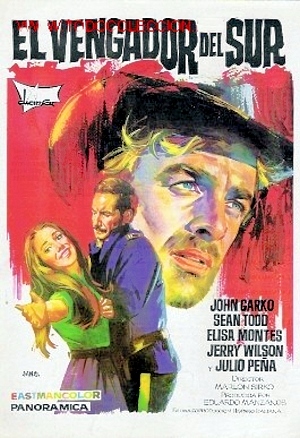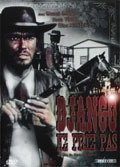
1968 – El Vengador del Sur (E) - Dir: Mario Siciliano – Cast: Gianni Garko, Ivan Rassimov (Sean Todd), Elisa Montes, Roberto Miali, Lorenzo Robledo, Luciano Pigozzi – Music: Manuel Parada (?), Gianni Marchetti (?)
Probably less known than any other spaghetti western starring Gianni Garko, this film has a small but loyal cult following of people who think this is Garko’s best performance as well as director Mario Siciliano’s best film.
In the aftermath of the Civil war the fiancée of Brian, a southern war veteran (Garko) is killed by Northern vigilantes who represent the law. Thanks to his friend Daniel (Rassimov/Todd) Brian survives the attack and when his wounds are healed he starts looking for the killers with the help of Daniel and his brother Robert. This all sounds familiar, but if you think this is a straightforward revenge movie, you’re wrong. Very soon there are indications that the story will take another turn: Brian, suffering from amnesia, is growing more frustrated everyday, because he doesn’t remember the faces of the killers. Finally he starts killing people at random and both Daniel and Robert turn their backs upon him. In the meantime the authorities are trying to re-install law and order in the post-war society, and both brothers accept a job as sheriff. Of course, this is a notice of the third, even more radical turn the story is about to take: every time Brian sees an object in the form of the star, he is reminded of the fatal night of the attack, and during an incident, he kills Robert by accident, thinking he was involved in the crime …
With an avenger who eventually becomes the hunted, this film may well be unique within the genre of the revenge western. Contemporary critics seem to have preferred a quasi-freudian reading of the story (accredited to three screenwriters, but mainly written by Ernesto Gastaldi); in this interpretation Daniel becomes the father figure who realizes – by hunting Brian down - everything the frustrated Daniel was striving after. Revenge not as a dish served cold, but as a violent sublimation of the libido, the absence of fulfillment making a man – understandably – insane. (This reading becomes particularly funny if you know the French gave it a title with Django in it). It was also read as an Italian retelling of the story of Billy the Kid versus Pat Garret, the aftermath of the Civil War replacing the range wars in which William Bonney mad his name. Anyway, Brian is quite a complicated character, and Garko reportedly has admitted that it was very difficult to play him convincingly. I like the film, but I do not agree with those who think this is Garko’s best performance. His history as a stage actor seems to work a little against him here: stage actors have a tendency to show things instead of suggesting them; in the opening scene Garko literally clenches his fists out of suppressed rage and later he underlines the mental breakdown of his character with an increasingly mad laugh, every time he is reminded of the fatal night.
The film falls apart in two considerably different halves: a action oriented first and a more restrained, psychological second. Although the action scenes are competently staged, the second part is by far the best. The description of the confusion in a post-war society, often a concern of Italian directors and screenwriters, is particularly fine here, with the underrated Rassimov giving a first rate performance as a desperate man who accepts the work as a sheriff more out of confusion than conviction, but who gradually becomes aware of the fact that the work he’s doing, is a necessity in the process of building up a post-war society. The end, set in railroad tunnel, and at first glance more appropriate to a horror move (like some other scenes), is both harrowing and exciting, with a well-prepared and well-executed ‘twist ending’ that I won’t give away.
Overall this is an intriguing western, probably not convincing in all departments, a bit slow-moving from time to time, but with an above average story, describing the threadbare revenge story from an original angle. The score was also a nice surprise to me: choral chanting alternated with a languid guitar and triumphant orchestral outbursts, it serves the film very well. There’s some confusion about who composed it: Manuel Parada’s name is on the credits, but CD releases mention Gianni Marchetti as composer. The greatest problem might be to find a decent copy of the movie. The only official DVD is a French release from the infamous Evidis label and as far as I know there are no reconstruction versions in circulation. Shobary mentions a Dutch VHS, called Taste of Vengeance, no idea if that is still around.

Okay, this DVD from Evidis, a label famous for its ultra cheap releases (usually of hard to find movies) with only French audio, no subtitles and no extras, not even a menu. Because some titles are really hard to find, sometimes crazy prices are asked for their releases. I saw this one offered for over 25 € on the Net. To begin with the good news: the image, although not anamorphic, is quite good. Colours have faded considerably, but print damage is reduced to some specks and vertical lines and sharpness and contrast are more than tolerable. The problem is the sound : overall dialogue sounds either dull or hollow, but occasionally it falls down to a volume level where it becomes totally incomprehensible, even hardly audible; at the same time ambient sounds are quite loud, causing some deafening surprises when you had the brilliant idea to put up the volume.
For more info visit:
Database page: Vigliacchi non pregano, I - The Spaghetti Western Database
- 5
- 4
- 3
- 2
- 1
0 voters

